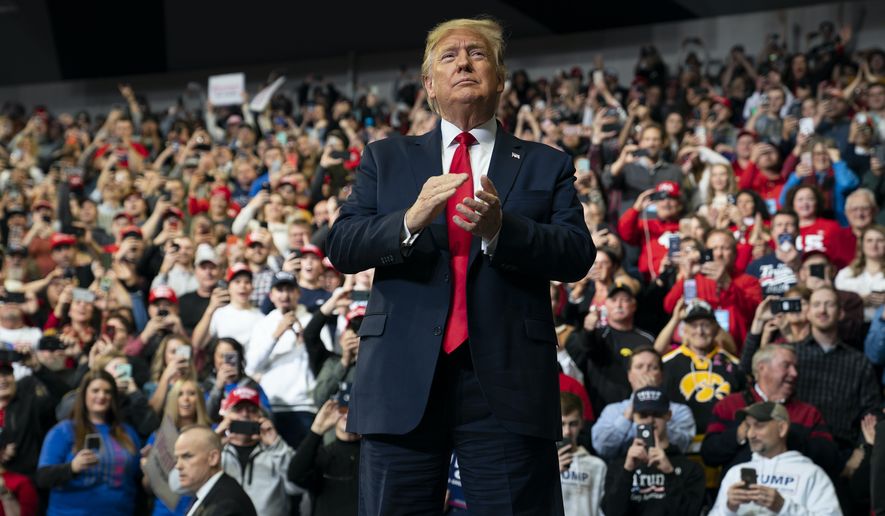President Trump made “relentless” efforts to get the Justice Department to dig into reports of election malfeasance in the wake of the 2020 vote, but the department’s leaders said he did not pressure them into crossing any lines, according to two Senate reports released Thursday.
In late December and early January, Mr. Trump and his team were sending over myriad claims and rumors of fraud to acting Attorney General Jeffrey Rosen, the Senate Judiciary Committee reports state.
Mr. Trump also pondered whether to back a plan to have the Justice Department send letters telling states to revoke their Electoral College results and install new slates of electors, according to the committee’s investigation.
But after a tense Jan. 3 meeting with top department leaders and White House staff, where the president was told he would see mass resignations, he decided against a deeper intervention.
Mr. Trump also rejected the idea of firing acting Attorney General Jeffrey Rosen, according to the testimony of key witnesses, though he did push the U.S. attorney for northern Georgia to quit days early.
Democrats and Republicans on the committee participated in the investigation, and each side released its own report.
The one from Chairman Richard J. Durbin, Illinois Democrat, put the findings in a catastrophic light. It said the government escaped an unprecedented fracture only because Justice Department officials stood up to Mr. Trump.
“It was a nonstop, relentless effort by Trump. The goal was to try to get Rosen to the point where he would question the results of the election and send letters to governors and state leaders asking them to withhold sending the Electoral College count,” Mr. Durbin told reporters Thursday. “I think we were half a step away from a full-blown constitutional crisis.”
The other report, from Sen. Chuck Grassley of Iowa, the top Republican on the panel, put the findings in a much less dire light. It said Mr. Trump’s team was notifying the Justice Department of accusations that had arisen but did not put undue pressure on the department’s leaders.
“The fact is, none of these steps were taken because President Trump made the ultimate decision not to,” Mr. Grassley said in a speech on the Senate floor. “At each of these critical decision points, the president asked his advisers for their candid views and recommendations, and he followed them.”
Then-acting Deputy Attorney General Richard Donoghue, one of three witnesses in the committee’s inquiry, testified that Mr. Trump did not change the way the department pursued its election investigations.
“I would say it had no impact,” he said. “We did what we were going to do, regardless.”
Mr. Rosen told investigators that Mr. Trump, despite questions, accepted his recommendations on how the department should proceed.
Mr. Trump did keep “close contact” with the department in the weeks after the election, the Republican report says, but Justice Department leaders talked him out of some of the more strenuous steps he contemplated.
Much of the investigation focused on the Jan. 3 meeting where Mr. Trump pondered ousting department leadership and installing someone more eager to pursue his election claims.
The Democrats’ report describes a tense, three-hour ordeal where Mr. Trump relented only after the top White House attorney, Pat Cipollone, said it would be a “murder-suicide pact” to proceed with the firings. Mr. Cipollone also threatened to resign, according to the report.
The Republicans’ report acknowledged the tensions of the meeting but pointed to testimony that Mr. Trump solicited ideas from all sides before making up his mind.
“And in the end, he made the decision that we felt was appropriate,” Mr. Donoghue testified.
The Republican report said it was understandable that Mr. Trump was skeptical of getting a proper investigation, given his history with the Justice Department.
Mr. Trump was still smarting over the department’s pursuit of a secret investigation into his behavior toward Russia stemming from the 2016 campaign. The investigation culminated in the use of the discredited Christopher Steele dossier to cajole a court into approving wiretaps and, eventually, in the two-year special counsel’s probe that undercut the Russia accusations.
The dueling reports give new details on Mr. Trump’s desperate bid to cling to office after the vote count showed he lost.
Attorney General William Barr, in the days after the election, directed the Justice Department to take a look at the voting.
Mr. Barr announced in December that he had seen no evidence of widespread fraud. He then resigned. When Mr. Rosen took over, the Trump team renewed its effort to get the Justice Department more deeply involved.
The Democrats’ report doesn’t shed much new light on Mr. Trump’s actions but does reveal further details about others’, including Jeffrey Clark, who was head of the department’s civil division.
Mr. Clark tried to get Mr. Rosen to pursue claims of election fraud, the report said. He was the force behind the strategy to have the department send letters urging states to replace their chosen electors.
Mr. Durbin’s report said Mr. Trump was pondering firing Mr. Rosen and installing Mr. Clark. Mr. Clark said he would decline the promotion if the department pursued the investigations.
Mr. Grassley’s report says Mr. Clark was acting on his own. Although Mr. Trump was intrigued by what he was hearing, the president ultimately decided against Mr. Clark’s plan.
Democrats accused Mr. Clark of violating rules of professional conduct and said they asked the D.C. Bar to open an investigation.
Mr. Durbin’s report says Mark Meadows, Mr. Trump’s chief of staff, “repeatedly violated” a no-contact policy between the White House and the Justice Department by sending reports of suspected election irregularities.
Thursday’s release is an interim report, Mr. Durbin said. Investigators still want to talk with Mr. Clark, who has declined to be interviewed by the committee.
The chairman also said the committee is waiting for documents from the National Archives.
• Stephen Dinan can be reached at sdinan@washingtontimes.com.




Please read our comment policy before commenting.